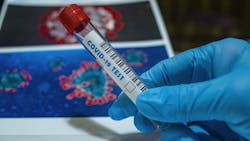FDA’s new tool to aid development and evaluation of diagnostic tests that detect SARS-CoV-2 infection
The U.S. Food and Drug Administration (FDA) took a new step to support the agency’s evaluation of diagnostic tests for COVID-19, by providing a SARS-CoV-2 reference panel. Reference panels are an additional step to ensure the quality of the tests, validation of new assays, test calibration and monitoring of assay performance.
Nucleic acid tests identify infection by confirming the presence of a virus’ genetic material (RNA) and the FDA-supplied reference panel provides developers access to this material. The FDA’s reference panel is an independent performance validation step for diagnostic tests of SARS-CoV-2 infection that are being used for clinical, not research, purposes. The FDA panel is available to commercial and laboratory developers who are interacting with the FDA through the pre-emergency use authorization (EUA) process.
These types of reference panels have proven to be an invaluable resource in the development of accurate, reliable, and validated diagnostic tests for detecting infectious diseases. The FDA has provided similar tools to assist industry in developing tests for other infectious diseases.
For example, since the Zika outbreak in 2015, through the collaborative work between CDRH and the Center for Biologics Evaluation and Research (CBER), the FDA has responded to the need to directly compare the performance of different diagnostic assays by developing and producing reference panels. This work resulted in the FDA making available first a Zika reference panel for molecular-based diagnostic tests, and then a panel of human plasma samples to support the regulatory evaluation of serological tests to detect recent Zika virus infection.
